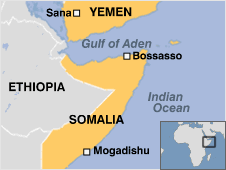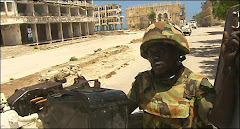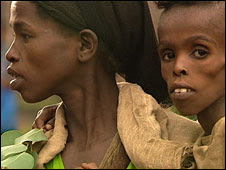For starters, I'm sure many of you have noticed that Somalia is in the headlines every so often. Somalia is a country located at the border of East Africa, and next to the Gulf of Aden and the Indian Ocean. There are constant problems in this poverty filled country, especially since 1991 when President Siad Barre was overthrown, causing Somalia to lose it's central government.
Going back a little further, Somalia was created in 1960 when a former British protectorate and an Italian colony merged, and ever since there have been issues involving territorial claims by counties such as Ethiopia and Kenya. In addition, deadly droughts between 1974 and 1975 have held back Somalia even further from developing as a country. So, as you can see, the conditions that are present in Somalia today have been the case for a while. However, the many disagreements between bordering countries as well as war-components have been some of the bigger causes of poverty in Somalia.
In 2006 Ethiopia decided to invade its neighboring country, Somalia. Why? Well there are many components to take into account. First of all, Somalia had been in progress of developing what was called a "transitional government" also known as Transitional Federal Institutions, or TFI. For most of 2006, this government was supported internationally, including support by Ethiopian forces. However, the Union of Islamic Courts (UIC), a group of Islamic fundamentalists, did not share the same views as Ethiopia and therefore created controversy. The UIC was not the most conventional but for the most part had Somalia's support. And when U.S. government agencies such as the CIA got involved to try to stop them for a number of reasons, Somali people supported them all the more.
During the summer of 2006, the UIC captured Mogadishu, Somalia's capital. At this point Somalia's transitional government headquarters are planted in Baidoa, an inland city. These headquarters are also protected by Ethiopian troops. Unfortunately though, UIC forces also decided to invade Baidoa. Eventually, UIC forces ended up in a quarrel with Ethiopian forces and more conflict resulted. After a troubling clash, Ethiopia finally took back Mogadishu from the UIC.
And don't forget how the U.S. is involved:
The United States gave all it's support to Ethiopia, but at the same did not fully approve of the idea of it's invasion. A BBC article printed last year quoted from US Central Command, General John Abizaid that "Somalia would become 'Ethiopia's Iraq'" (Plaut). And the reason that the United States is involved to begin with is that Somalia has become a hiding place for those involved in "al-Qaeda operatives". In addition Somalia's coasts happen to be overlookers on the route that oil from the Middle East takes to get to us, the United States. One of many disagreements is whether or not we should be supporting Ethiopia, because even though they share the same interests and ideas as us, they treat their citizens with no respect and leave them living without basic needs such as food and water.
These are the basic background components of Somalia's situation, but after all this, the real questions are: What is going on in Somalia today? How is Somalia handling this?
There are many countries in our world today that live on less than two dollars a day, and unfortunately Somalia is one of them. Poverty has a huge impact here, especially as a result of the attacks from Ethiopia. Thousands of people are dying and people are being displaced, sending them into more poverty. They are lacking water, sanitation, health, and education. In October of 2004 the TFI chose Abdullahi Yusuf Ahmed as their president, but as a result of various disagreements, he has failed to bring the country out of these unfortunate events. There is no proper protection supplied by Somalia's government or from the government themselves. The government is not seeking to help the people or improve their living conditions.
Recently, African Union (AU) peacekeeping troops (mostly from Uganda) have been in Somalia doing what they can to rebuild their government. However they are not close to success because they are constantly being attacked and lack military forces. At this time Somali citizens are greatly in need of even more help which they are not getting.
Sources:
"Country Profile: Somalia." BBC NEWS. 18 June 2008. 23 Sept. 2008
http://news.bbc.co.uk/2/hi/africa/country_profiles/1072592.stm.
Nouraee, Andisheh. "Why did Ethiopia invade Somalia?" Creative Loafing. 3 Jan. 2007. 11
Oct. 2008 http://http//charlotte.creativeloafing.com/gyrobase/content?oid=oid%3a114257.
Plaut, Martin. "Ethiopia in Somalia: One year on." BBC NEWS. 28 Dec. 2007. 11 Oct. 2008
http://http//news.bbc.co.uk/2/hi/africa/7155868.stm.
Subscribe to:
Post Comments (Atom)






No comments:
Post a Comment